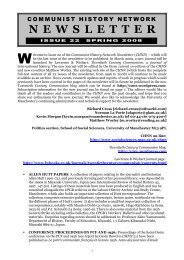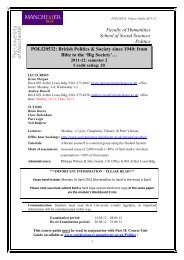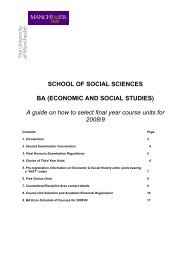second year course outlines 2012-2013 - School of Social Sciences ...
second year course outlines 2012-2013 - School of Social Sciences ...
second year course outlines 2012-2013 - School of Social Sciences ...
You also want an ePaper? Increase the reach of your titles
YUMPU automatically turns print PDFs into web optimized ePapers that Google loves.
aspects <strong>of</strong> the work <strong>of</strong> some <strong>of</strong> the most important Twentieth Century phenomenologists:<br />
Edmund<br />
Husserl, Martin Heidegger, Edith Stein, Jean-Paul Sartre and Maurice Merleau-Ponty.<br />
Topics<br />
covered may include: the nature <strong>of</strong> intentionality, perception and imagination; our awareness<br />
<strong>of</strong><br />
self, body and others; and our consciousness <strong>of</strong> time. We shall also look at what is<br />
distinctive<br />
about the methods <strong>of</strong> phenomenological philosophy.<br />
Aims<br />
The <strong>course</strong> aims to:<br />
• introduce students to the philosophical writings <strong>of</strong> the Twentieth Century phenomenologists;<br />
• present the historical and philosophical context in which phenomenology was developed;<br />
• explore in detail some central concepts <strong>of</strong> phenomenology: intentionality, reduction,<br />
constitution,<br />
transcendental ego, time-consciousness, embodiment, intersubjectivity, etc;<br />
• show how phenomenology relates to issues in metaphysics, epistemology and the<br />
philosophy <strong>of</strong><br />
mind.<br />
Learning Outcomes<br />
On successful completion <strong>of</strong> this <strong>course</strong> unit, students will be able to demonstrate:<br />
• an ability to identify the main philosophical questions arising in phenomenological texts;<br />
• an ability to engage with some <strong>of</strong> the major issues in the interpretation <strong>of</strong> the<br />
phenomenological<br />
tradition in philosophy;<br />
• an ability to evaluate the significance <strong>of</strong> phenomenological philosophy;<br />
• an ability to relate the work <strong>of</strong> Husserl, Heidegger, Sartre and Merleau-Ponty to other<br />
philosophical disciplines.<br />
3<br />
3. COURSE ORGANISATION<br />
Lectures: Tuesdays 11-1pm in Coupland 3 Theatre B<br />
Tutorials:<br />
DAY & TIME LOCATION TEACHING ASSISTANT<br />
Friday 11-12pm Coupland 3 LG9<br />
Friday 12-1pm Humanities Bridgeford St G.34 Howard Kelly<br />
Friday 1-2pm University Place 4.208<br />
Tutorials are weekly, starting in week 2. Attendance at tutorials is compulsory. It is students’<br />
responsibility to ensure that they have been allocated to a tutorial group. Students may not<br />
change<br />
group without permission.<br />
Work and attendance<br />
The work and attendance requirements for this <strong>course</strong> are that you:<br />
• Attend all tutorials<br />
If you are absent from a tutorial through illness you should inform your tutor and fill in a<br />
Certification <strong>of</strong> Student Ill Health (available from your department or from the SoSS UG<br />
Office;<br />
see you degree programme handbook for further details). If you are absent for another<br />
reason<br />
you should tell your tutor or the Philosophy Administrator, Caroline Harmer as soon as<br />
possible – if possible, before the tutorial.<br />
• Prepare adequately for tutorials<br />
You will be set preparatory work for tutorials; see the study budget below for a guide to<br />
roughly how long you should spend on this.<br />
• Complete written work on time<br />
Failure to complete assessed work by the due date constitutes a violation <strong>of</strong> the work and<br />
41

















